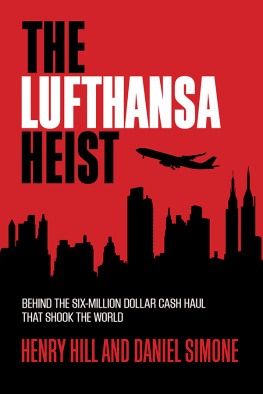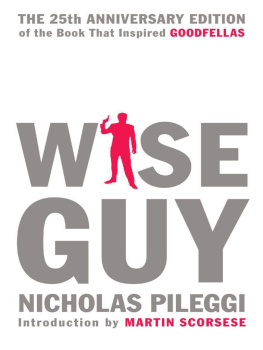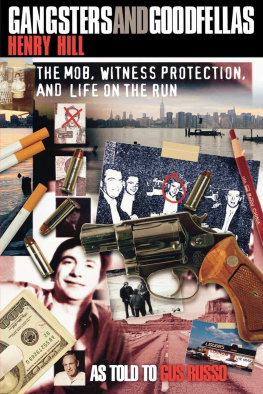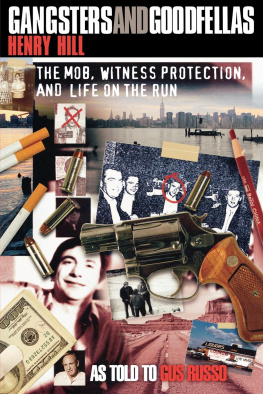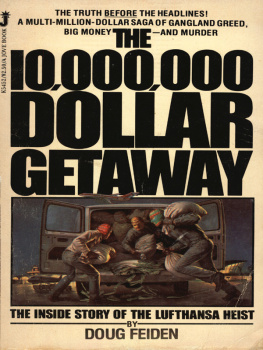GoodFellas
Nicholas Pileggi
Contents
On Tuesday, May 22, 1980, a man named Henry Hill did what seemed to him the only sensible thing to do: he decided to cease to exist. He was in the Nassau County jail, facing a life sentence in a massive narcotics conspiracy. The federal prosecutors were asking him about his role in the $6 million Lufthansa German Airlines robbery, the largest successful cash robbery in American history. The New York City police were in line behind the feds to ask him about the ten murders that followed the Lufthansa heist. The Justice Department wanted to talk to him about his connection with a murder that also involved Michele Sindona, the convicted Italian financier. The Organized Crime Strike Force wanted to know about the Boston College basketball players he had bribed in a point-shaving scheme. Treasury agents were looking for the crates of automatic weapons and Claymore mines he had had stolen from a Connecticut armory. The Brooklyn district attorneys office wanted information about a body they had found in a refrigeration truck which was frozen so stiff it needed two days to thaw before the medical examiner could perform an autopsy.
When Henry Hill had been arrested only three weeks earlier, it hadnt been big news. There were no front-page stories in the newspapers and no segments on the evening news. His arrest was just another of dozens of the slightly exaggerated multimillion-dollar drug busts that police make annually in their search for paragraphs of praise. But the arrest of Henry Hill was a prize beyond measure. Hill had grown up in the mob. He was only a mechanic, but he knew everything. He knew how it worked. He knew who oiled the machinery. He knew, literally, where the bodies were buried. If he talked, the police knew that Henry Hill could give them the key to dozens of indictments and convictions. And even if he didnt talk, Henry Hill knew that his own friends would kill him just as they had killed nearly everyone who had been involved in the Lufthansa robbery. In jail Henry heard the news: his own protector, Paul Vario, the seventy-year-old mob chief in whose house Henry had been raised from childhood, was through with him; and James Jimmy the Gent Burke, Henrys closest friend, his confidant and partner, the man he had been scheming and hustling with since he was thirteen years old, was planning to murder him.
Under the circumstances, Henry made his decision: he became part of the Justice Departments Federal Witness Protection Program. His wife, Karen, and their children, Judy, fifteen, and Ruth, twelve, ceased to exist along with him. They were given new identities. It should be said that it was slightly easier for Henry Hill to cease to exist than it might have been for an average citizen, since the actual evidence of Hills existence was extraordinarily slim. His home was apparently owned by his mother-in-law. His car was registered in his wifes name. His Social Security cards and drivers licenses he had several of each were forged and made out to fictitious names. He had never voted and he had never paid taxes. He had never even flown on an airplane using a ticket made out in his own name. In fact one of the only pieces of documentary evidence that proved without doubt that Henry Hill had lived besides his birth certificate was his yellow sheet, the police record of arrests he had begun as a teenage apprentice to the mob.
A year after Henry Hills arrest I was approached by his attorney, who said that Hill was looking for someone to write his story. At that point I had been writing about organized-crime figures for most of my career as a journalist and had gotten bored with the egomaniacal ravings of illiterate hoods masquerading as benevolent Godfathers. In addition, I had never heard of Henry Hill. In my office are four boxes of index cards upon which I compulsively jot the names and various details of every major and minor organized-crime figure I run across in the press or court dockets. When I looked in it I discovered I had a card on Hill, dated from 1970 and misidentifying him as a member of the Joseph Bonanno crime family. And yet, from the mountain of data the feds had begun to compile about him since his arrest a year earlier and the importance they attached to him as a witness, it was clear that Henry Hill was at least worth meeting.
Since he was in the Federal Witness Program, the meeting had to take place at a location where his safety was guaranteed. I was instructed to meet two federal marshals at the Braniff counter at LaGuardia Airport. When I got there the two men had my ticket in their hands. They asked if I had to go to the bathroom. It struck me as a bizarre question coming from federal agents, but they explained that once they gave me the ticket I could not leave their sight until we boarded the plane. They couldnt take the chance that I might see the destination and tip someone off as to where I was going. As it turned out, the plane we took was not a Braniff plane, and the first place we landed was not the place where Henry Hill was waiting. It took more than one flight that day to finally get to a town where, I learned later, Hill and his federal agent bodyguards had arrived just a couple of hours earlier.
Hill was a surprising man. He didnt look or act like most of the street hoods I had come across. He spoke coherently and fairly grammatically. He smiled occasionally. He knew a great deal about the world in which he had been raised, but he spoke about it with an odd detachment, and he had an outsiders eye for detail. Most of the mobsters who have been interviewed for books and articles over the years have been unable to detach themselves from their experiences long enough to put their lives in some perspective. They so blindly followed the mobsters path that they rarely saw any of the scenery along the way. Henry Hill was all eyes. He was fascinated by the world in which he had grown up, and there was very little about it that he did not remember.
Henry Hill was a hood. He was a hustler. He had schemed and plotted and broken heads. He knew how to bribe and he knew how to con. He was a full-time working racketeer, an articulate hoodlum from organized crime, the kind of rara avis that should please social anthropologists as much as cops. On the street he and his friends referred to each other as wiseguys. It seemed to me that a book about his life might provide an insiders look at a world usually heard about either from the outside or from the capo di tutti capi, top.
Henry Hill was introduced to life in the mob almost by accident. In 1955, when he was eleven years old, he wandered into a drab, paint-flecked cabstand at 391 Pine Street, near Pitkin Avenue, in the Brownsville-East New York section of Brooklyn, looking for a part-time, after-school job. The one-story, storefront cabstand and dispatch office was directly across the street from where he lived with his mother, father, four older sisters, and two brothers, and Henry had been intrigued by the place almost as far back as he could remember. Even before he went to work there Henry had seen the long black Cadillacs and Lincolns glide into the block. He had watched the expressionless faces of the cabstand visitors, and he always remembered their huge, wide coats. Some of the visitors were so large that when they hauled themselves out of their cars, the vehicles rose by inches. He saw glittering rings and jewel-studded belt buckles and thick gold wrist bands holding wafer-thin platinum watches.
The men at the cabstand were not like anyone else from the neighborhood. They wore silk suits in the morning and would drape the fenders of their cars with handkerchiefs before leaning back for a talk. He had watched them double-park their cars and never get tickets, even when they parked smack in front of a fire hydrant. In the winter he had seen the citys sanitation trucks plow the snow from the cabstands parking lot before getting around to cleaning the school yard and hospital grounds. In the summer he could hear the noisy all-night card games, and he knew that no one not even Mr. Mancuso, who lived down the block and groused about everything would dare to complain. And the men at the cabstand were rich. They flashed wads of twenty-dollar bills as round as softballs and they sported diamond pinky rings the size of walnuts. The sight of all that wealth, and power, and girth was intoxicating.


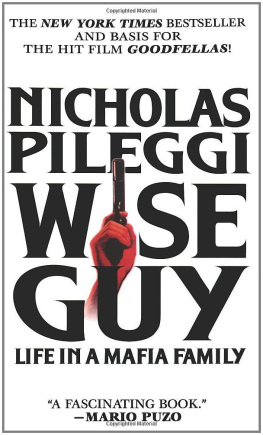
![Pileggi - Casino [eBook - NC Digital Library]: Love and Honor in Las Vegas](/uploads/posts/book/227422/thumbs/pileggi-casino-ebook-nc-digital-library-love.jpg)
